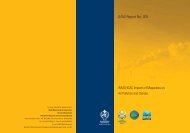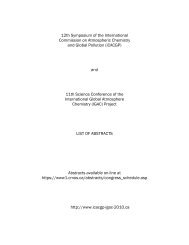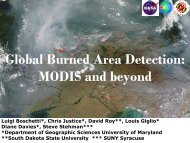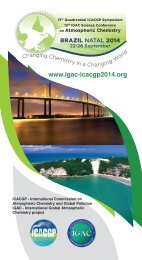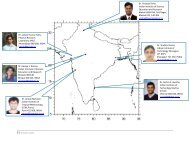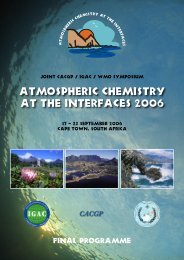Issue 27 Jan 2003 - IGAC Project
Issue 27 Jan 2003 - IGAC Project
Issue 27 Jan 2003 - IGAC Project
You also want an ePaper? Increase the reach of your titles
YUMPU automatically turns print PDFs into web optimized ePapers that Google loves.
asis. Results are in publication or to be submitted that<br />
describe measurements in countries with DEBITS sites<br />
including Australia, China, India, Indonesia, Malaysia,<br />
Singapore, Thailand and Vietnam.<br />
In Amazonia, the situation is distinctive because of the<br />
intense collaboration and merging of DEBITS and LBA<br />
which allows high quality validation of measurements (see<br />
article in this issue). This type of scientific interaction<br />
between a regional program and DEBITS is an ideal model<br />
for the future implementation of DEBITS. The linkage<br />
between atmospheric deposition and regional development<br />
strategies is not only critical for Amazonia but also for<br />
tropical regions around the world.<br />
In the near future, DEBITS must take into consideration<br />
the evolving goals of <strong>IGAC</strong> and IGBP as they enter their<br />
next phase. The new structure of IGBP includes six<br />
research activities focused on the three primary Earth<br />
System components (ocean, land, and atmosphere) and the<br />
interfaces between them. Atmospheric deposition studies<br />
position DEBITS at the interface of the land and atmosphere.<br />
The <strong>IGAC</strong> steering committee has proposed to integrate<br />
DEBITS within the new Land – Atmosphere project<br />
(iLEAPS).<br />
DEBITS can also serve as a model for the new projects<br />
within the integrated Global Change programs (IGBP,<br />
IHDP, WCRP and DIVERSITAS) as they develop<br />
Integrated Regional Studies. These interdisciplinary<br />
regional studies will focus on specific regions which are<br />
thought to be of primary importance for the functioning of<br />
the Earth system. An integrated social, economic, and<br />
physico-chemical approach will maximize the benefit of<br />
this large international and integrated research effort.<br />
DEBITS could adopt a dual approach in the future:<br />
1) A network strategy that maintains the existing measurement<br />
structure, including already established collaborations,<br />
and continues dry deposition measurements and<br />
associated modelling activities with a goal of producing<br />
long term data sets. These data can be used to address the<br />
significant questions that remain in our understanding of<br />
key aspects of the chemical processes that regulate the<br />
multiple phases (gas, aerosol, clouds) of deposition,<br />
2) An integrated regional strategy within the new global<br />
scientific context of IGBP II. The iLEAPS framework and<br />
the Integrated Regional studies appear to favour an<br />
approach similar to the regional tactic used by LBA in<br />
Amazonia.<br />
To implement this dual approach, a team of 3-4 DEBITS<br />
scientists from the existing activity will compose a new<br />
DEBITS science plan. Following the advice of the present<br />
convenors, this team will include Paulo Artaxo (LBA),<br />
Kobus Pienaar (Africa), and one or two members from the<br />
Asian component. The enthusiastic support of all DEBITS<br />
scientists will be essential to ensure the continuing success<br />
of the DEBITS activity.<br />
REFERENCES<br />
Acidification in Tropical Countries, H. Rodhe and R. Herrera<br />
(eds.), SCOPE 36, John Wiley & Sons, UK, 1988.<br />
http://www.icsu-scope.org/<br />
10<br />
30<br />
LBA<br />
5<br />
4<br />
IDAF<br />
CAAP<br />
Figure 1 - DEBITS network in 2002. Numbers indicate the number of stations in each region.<br />
<strong>IGAC</strong>tivities 5



